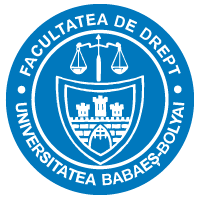Faculty of Law
The beginnings of law education in Cluj go back to the end of the sixteenth century. For over three centuries education was conducted in Latin, German and Hungarian. Beginning with 1919, after the unification of Transylvania with Romania, teaching was done in Romanian. Among the first teachers in the Faculty of Law of the Dacia Superior University there were famous personalities in the field of law such as: professor Victor Onişor, author of the first complete textbook of administrative law in the country, professor Traian Pop, penal law and criminologist with extensive activity in the two areas, professor Romulus Boilă, a specialist in constitutional law; Ion Cătuneanu, Roman law professor; Vasile Dimitriu, professor of business law and the first elected rector of the University of Cluj; Camil Negrea, professor of local civil law and also rector of the university; Emil Haţieganu, former honorary member of the Romanian Academy.
In 1934 the Faculty of Law in Oradea merged with that in Cluj. New valuable teachers joined then the teaching staff, worth mentioning professor Aurelian Ionaşcu, prolific author in the field of civil law; professor Eugeniu Speranţia, author of seminal works in the history of legal philosophy, sociology and legal logic; professor Sofronie George, author of important works of international public law; professor Victor Cădere, who was elected a corresponding member of the Institute of France. In the interwar period other outstanding personalities who have published books and articles in France, Germany, Italy and other European countries and were known and appreciated among the international academia became Cluj university professors. Professor Tudor Drăganu began at this time his activity in the department of constitutional and administrative law; he became one of the most respected authors in these fields, and after the war he was elected president and vice president of several international organizations.
In the summer of 1940, following the Vienna Dictate, the Faculty of Law, together with other faculties of the University of Cluj, moved to Sibiu. After the reintegration of Northern Transylvania in Romania, the university returned to Cluj beginning with the 1945-1946 academic year. For a while, there were two faculties of law in Cluj in the two universities: Victor Babeș with teaching in Romanian and Janos Bolyai with teaching in Hungarian. The two universities, respectively the two law faculties, merged in 1959.
Throughout the postwar period prestigious teachers continued the tradition of the Cluj law school, teaching besides traditional subject matters a series of new disciplines, publishing numerous courses, treatises, monographs and studies.
After 1989, in the context of profound political and social changes in Romania, the Faculty of Law has undergone major changes. The number of students increased and new valuable teachers were employed. The academic curricula was restructured, the offer of courses and their content as well as the methods of teaching and learning were renewed and diversified. The multicultural dimension of the faculty developed increasing the number of students belonging to different ethnic groups in Romania, offering courses in foreign languages and in Hungarian. Given the broad international openness of the Babes-Bolyai University, the Faculty of Law has intensified its cooperation with European and American universities in programmes financed by the European Union, World Bank and other institutions.
The Faculty offers a main degree programme of 4 years (both in full time learning and in distance learning), which is completed with a law degree.
It also provides several master's programmes:
- Private Law Institutions
- Forensic Science and Criminology
- European and Domestic Business Law
- EU Private Law (in Hungarian)
- Comparative Private Law/ Droit privé comparé (in French)
- International and Comparative Business Law (in English)
The Faculty provides doctoral studies in the following fields:
- Civil Law
- Business law
- Criminal law
- Criminal procedural law
- Roman law
- Administrative law
Law School Graduates can hold different positions, namely:
- magistrates (judges and prosecutors);
- magistracy auxiliaries (judicial assistants, bailiffs, land clerks, registrars, secretaries to the courts and prosecutors' offices);
- lawyers and their secretaries in the civil societies of law or individual offices; notaries and their secretaries;
- legal advisers to companies, autonomous or national companies;
- officials in central and local public administration;
- managers or advisors to their firms;
- experts besides governmental or non-governmental organizations;
- workers in the police and security services;
- any job requiring legal training.
There are two departments within the faculty with around 40 teachers.





